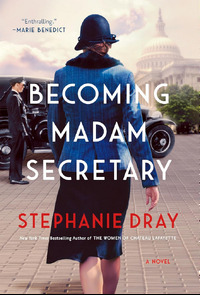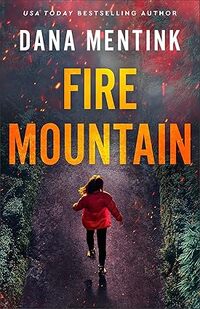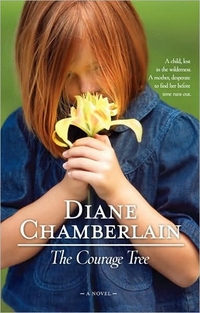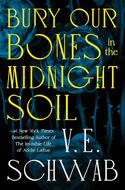 BECOMING MADAM SECRETARY |
|

A child lost in the wilderness, a mother desperate to find her before time runs out.
MIRA
Excerpt The guest cottage seemed stuffy, its four small rooms overflowing with sunlight. At two-thirty, Janine turned off the air-conditioning and opened all the windows, starting in her bedroom and Sophie's room, then the kitchen and finally the living room. Although it became instantly warmer in the cottage, the air was arid, a remarkable phenomenon for June in northern Virginia, and the faint breeze carried the scent of magnolia and lavender into the rooms. Janine sat sideways on the sofa in the living room, her back against the overstuffed arm, bare feet up on the cushions, gazing out the window at Ayr Creek's gardens. In fifteen minutes she could leave, she told herself. That would make her early, but there was no way she could wait here any longer. The view of the gardens was spectacular from this window. Bands of red and violet, yellow and pink dipped and swirled over more than two acres of rolling landscape before losing themselves in the deep woods between the cottage and the mansion. The nineteenth century, yellow frame, black-shuttered mansion could barely be seen at this time of year due to the lush growth on the trees, allowing Janine to imagine that she was master of her own life and not living on her parents' property. Not that Ayr Creek truly belonged to her parents, who were little more than caretakers. The house was owned by the Ayr Creek Foundation, which was operated by the descendants of the estate's original owner, Angus Campbell. The Foundation had deeded enough money to the county to keep the garden and a few of the mansion's rooms open to the public on weekends. And through some quiet arrangement, Janine's mother, Donna Campbell Snyder, had been given the right to live in the mansion until her death, although she did not otherwise have a cent of her family's fortune. This, Janine had always thought, was the source of her mother's bitterness. Nevertheless, Donna and Frank Snyder adored the Ayr Creek estate. Retired history teachers, they relished the task of over-seeing the upkeep of the house and gardens. And they willingly allowed Janine and her daughter, Sophie, to live rent-free in the "guest cottage," a euphemism designed to masquerade the true history of the diminutive structure: it had once been home to Ayr Creek's slaves. There was a tear in the window screen. Just a small one, and if Janine closed one eye and leaned nearer to the screen, she could see one perfect, blue-blossomed hydrangea captured in the opening. If she leaned a little farther to the left, she could see the roses Lucas had planted near the wishing well. She should get up and repair the hole instead of playing games with it, she thought briefly, but shifted positions on the sofa and returned her attention to the gardens instead. This restlessness, this stuffy, claustrophobic feeling, had been with her all weekend and she knew it was of her own creation. She had not drawn a full breath of air since Friday evening, when she'd watched her daughter ride away in the van with the rest of her Brownie troop. Sophie had grinned and giggled with her friends, looking for all the world like a perfectly healthy eight-year-old girl—except, perhaps, for the pallor and the delicate, willowy, white arms and legs. Janine had waved after the van until she could no longer make out Sophie's red hair against the tinted window. Then she offered a quick smile to the two other mothers in the parking lot of Meadowlark Gardens and got into her car quickly, hoping that the worry hadn't shown in her face. There hadn't been a day in the last five years that she had not worried. She'd planned to use this weekend alone to clean the cottage from top to bottom, but she'd gotten little done. She'd spent time on Saturday with her mother in the mansion, helping her research historically accurate wallpaper patterns on the Internet for one of the mansion's bedrooms, and listening to her complain yet again about Lucas, the horticulturist in charge of the gardens. Janine knew, though, that she and her mother were both preoccupied with thoughts of Sophie. Was she all right? Eight years old seemed far too young to be spending the weekend at a Girl Scout camp nearly two hours away, even to Janine, and she knew her mother was furious with her for allowing Sophie to go. Sitting in the office, which was part of the mansion's twentieth-century addition, Janine had tried to concentrate on the computer monitor while her mother leaned over her shoulder. "It's hot out and she'll drink too much water," her mother said. "She'll forget to take her pills. She'll eat the wrong things. You know how kids are." "She'll be fine, Mom," Janine had said through gritted teeth, although she couldn't help but share her mother's concerns. If Sophie came back from this trip sicker than when she went, the criticism from her parents would never end. Joe would be furious, as well. He had called last night, wanting to know if he could come over to see Sophie after she got home tonight, and Janine knew he was feeling what she did: the deep love and concern for the child they both treasured. Like Janine's mother, Joe had expressed strong disapproval over Sophie's going on this trip. One of many things Joe was angry with her about. Joe's anger was hard for Janine to ignore, because she knew it came from a place of caring, not only about Sophie, but about herself, as well. Even in the ugliest moments of their separation and divorce, she'd been aware that Joe still loved her. At two-forty-five, Janine left the cottage and got into her car. She drove down the long gravel driveway, banked on both sides by boxwood as old as the estate itself, and looked toward the mansion as she passed it. Her parents would be inside, waiting anxiously for her to bring their granddaughter home. She hoped she'd have some time alone with Sophie before she had to share her with them and Joe. Meadowlark Gardens was less than half a mile from the Ayr Creek estate, and the parking lot of the public gardens was as full as she'd ever seen it. As Janine turned into the lot from Beulah Road, people dressed in wedding regalia spilled out of one of the brick buildings, probably getting ready to pose for pictures. In the distance, Janine could see another wedding taking place in the gazebo by the pond. A beautiful day for a wedding, she thought, as she drove toward the southeastern corner of the lot, where she was to meet the returning Brownie troop, but her mind quickly slipped back to her daughter. Suddenly, all she could think about was scooping Sophie into her arms. She pressed her foot harder on the gas pedal, cruising far too fast through the lot, and parked her car near the corner. Although Janine was early, one other mother was already there, leaning against a station wagon, reading a paperback. Janine knew the woman, whose name was Suzanne, vaguely. She was pretty, a bit older than most mothers of children Sophie's age, and it was hard to tell if her chin-length hair was a pale blond or actually gray. Janine smiled as she walked toward her. "They certainly had great weather, didn't they?" Suzanne asked, shading her eyes from the sun. "They did." Janine joined her in leaning against the car. "I'm glad it wasn't too humid." Suzanne tossed her paperback through the open window of her car. "Oh, that wouldn't have bothered them," she said with a wave of her hand. "Kids don't care whether it's humid or not." Sophie would have cared, Janine thought, but she kept the words to herself. She tried unsuccessfully to remember what Suzanne's daughter looked like. In truth, she'd paid little attention to the other girls in Sophie's troop. It was so rare that Sophie could take part in any of their activities that Janine had had no opportunity to get to know any of them or their mothers. She looked at Suzanne. "Has your daughter…" she began. "I'm sorry, I don't remember her name." "Emily." "Has Emily been on one of these camp-outs before?" Janine asked. "Yes, she has," Suzanne said. "But none this far away. And I know this is a real first for Sophie, isn't it?" "Yes." She felt somehow touched that Suzanne knew Sophie's name. But, then, the other mothers probably talked about her. "It's wonderful she could go," Suzanne said. "I guess she's feeling better, huh?" "Much better," Janine admitted. So much better it was scary. "I heard she's receiving some sort of experimental treatment." "Yes." Janine nodded, then hesitated a moment before adding, "She's in a study of an alternative medicine. She's only been in the study a couple of months, but she's had some dramatic improvement. I'm just praying it will last." It was hard for Janine to give words to Sophie's improvement, to actually hear herself say those words out loud. She lived in terror that it might not last. Since being in the study, Sophie had not only remained out of the hospital, but had finally learned to ride a bike, had eaten almost anything she wanted, and had even attended the last of week of school. For most of the year, she'd been tutored at home or in the hospital, and last year had been equally as bad. Most indicative of Sophie's improvement, though, was the fact that she no longer needed to spend every night attached to her dialysis machine. For the last couple of weeks, she'd required treatments only two nights a week. That had given her the freedom to do something she'd never before been able to do: spend the night away from home with her friends. Sophie's astonishing improvement seemed miraculous, although Dr. Schaefer, the researcher behind the study, had warned Janine that her daughter still had a long road ahead of her. She would need to receive twice-weekly intravenous infusions of Herbalina, the name he had given his herbal remedy to make it more appealing to the pediatric population of the study, for at least another year. Despite the ground Sophie had gained, her own nephrologist, the doctor she'd been seeing for the past three years, scoffed at the study, as did every other specialist with whom Janine had spoken. They'd pleaded with Janine to enroll Sophie in a different, more conventional study of yet another experimental drug, but Sophie had already participated in several of those studies, and Janine could no longer bear to see her daughter suffer the side effects of the toxic drugs they gave her. With Herbalina, Sophie had only gotten better. No rashes. No cramps. No bloating. No sleepiness. The positive results were merely a temporary reduction in symptoms, Sophie's regular doctor and his colleagues had argued. Beneath the surface, the disease still raged. They claimed Schaefer offered false hope to the hopeless, but stopped just short of calling the small, wiry, soft-spoken doctor a charlatan. Janine could easily see the situation from their perspective. After all, the medical profession had been grappling with Sophie's form of kidney disease for decades, searching for a way to turn the tide of its destruction. Then along comes some alternative medicine doctor, with his combination of tree bark and herbs, and he thinks he can do what no one else has been able to do: cure the incurable. Sophie's regular doctor said Schaefer's treatment was nothing more than a Band-Aid, and it terrified Janine that he might be right. She was just getting her daughter back. She could not bear to lose her again. "Where are the other parents?" Janine looked behind her toward the parking lot entrance. It was nearly three. "Oh, I think it's just you and me. I'm going to drive a couple of the girls home. Gloria and Alison will take the rest, but we figured you'd probably be anxious to be with Sophie, so we didn't think to ask if you wanted one of us to give her a ride." "You're right," she said. "I can't wait to see how she made out." "She looked so excited when she got into the van Friday evening," Suzanne said. "She was." Janine was glad she was wearing sunglasses, because her eyes suddenly burned with tears. Her baby girl. How rare it was to have seen such unfettered joy in Sophie's face rather than the usual lines of pain and fear. The sort of fear no child should have to endure. "She's so cute," Suzanne said. "Where'd she get that red hair?" "It's a combination of mine and her dad's, I guess," she said, touching her hand to her own strawberry-blond hair. Joe's hair was dark, his eyes blue, like Sophie's. "It's her kidneys that are the problem, right?" Suzanne probed. "Yes." Janine didn't mind the questions. The only time she was bothered by them was when they were asked in front of her daughter, as though Sophie were deaf and blind as well as very, very ill. "Would a transplant help?" "She already has one of mine." Janine smiled ruefully. "Her body rejected it." Joe had offered one of his, as well, but he was not a good match. And now, Sophie was beyond being helped by a transplant. "Oh, I'm so sorry," Suzanne said kindly. "She seems to handle everything very well, though. I was so surprised when I met her, because she's so tiny. I thought she was about six. But then this eight-year-old voice comes out of her, with a ten-year-old vocabulary. It's such a surprise." Janine smiled. "Kids with kidney disease tend to be small." "What a lot you must have been through with her," Suzanne said. "And to think of how much I worry when Emily has the sniffles. I really admire you." Janine didn't feel admirable. She was coping the only way a desperate mother could—searching for solutions, doing all she could to make Sophie's time on earth as happy and carefree as possible… and crying only when she was alone at night. "Emily told me you're a helicopter pilot," Suzanne said. "Oh." Janine was surprised. "I was, a long time ago. Before Sophie got sick." She had learned to fly a helicopter in the army and had flown for an aircraft leasing company after getting out of the reserves. Was Sophie telling people she still flew? Maybe it embarrassed her that Janine had turned from an adventurous pilot into a stay-at-home mom. But with a chronically ill child, she could imagine no other course of action. "Emily has a secret hope that, when the girls in the troop get a little older, you might give them flying lessons." She had thought of that herself, in those rare, optimistic moments when she could picture Sophie reaching her teenage years. "Maybe one day," she said. "That would be fun." She turned to look at the parking lot entrance again. 
Our Past Week of Fresh Picks
LIMITED FIRST PRINT RUN--ALL first edition copies will be signed by the author! Signed copies available only for a limited time and while supplies Read More »
It’s a thin line between love and love-hating. Katie Vaughn has been burned by love in the past—now she may Read More »
There are no rules this cruel summer…“I think we should see other people…” That one sentence unravels Samantha Parker&rsquo Read More »
THE DEATH MASK From #1 New York Times bestselling author Iris Johansen comes a new thriller starring Eve Duncan as she races against time to protect her beloved Read More »
Set in the art world of 1970s London, The English Masterpiece is a fast-paced read to the end, full of glamour and Read More »
Detective Arkady Renko—“one of the most compelling figures in modern fiction” (USA TODAY)—returns in this tense thriller set amid Read More »
Eat Post Like is a heartwarming debut novel of self-discovery, resilience, and the transformative power of food.Cassie Brooks has her life all Read More »
In this million-copy international bestseller from Korea, the owner of a corner store takes in an unhoused man who does a good deed, a Read More »
|
|
| |||
|
||||












 Take a bite of this new novel!!
Take a bite of this new novel!!





 © 2003-2025
© 2003-2025